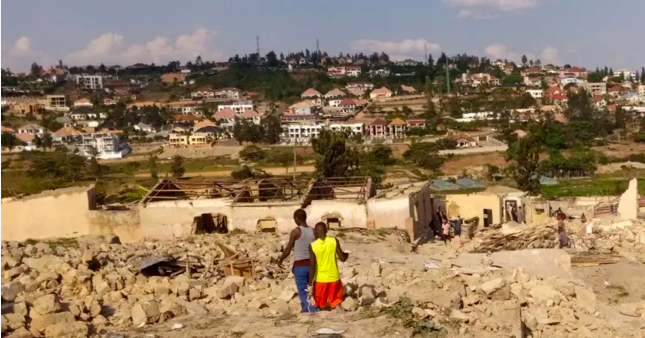On the evening of April 29, 2024, in Kigali, Rwanda, the High Court ruled in favor of several residents from the Nyarutarama area, historically known as Bannyahe, in their lawsuit against the City of Kigali for improper relocation practices. Despite the legal victory which mandates compensation based on the initial valuations of their properties in 2017, the residents express profound dissatisfaction and sadness over the resolution.
The issue began in 2017, with some cases extending to 2019, involving the forced relocation of residents from the well-known Bannyahe area, consisting of the Kibiraro and Kangondo neighborhoods, to a newly developed high-rise village in Busanza, Kicukiro District. The city orchestrated the relocation, with some residents moving voluntarily and others under duress, claiming the land for investor development. Those who resisted were subsequently embroiled in legal battles against the government, accusing it of overlooking laws that stipulate fair compensation for expropriated land and undervaluing their properties compared to the smaller, less valuable residences provided in Busanza.
The court’s verdict acknowledged the original agreement between the residents and the City of Kigali, setting the compensation based on the 2017 property valuations. Back then, the city had assessed the land at 12,000 Rwandan Francs per square meter, which has starkly increased to 130,000 Rwandan Francs per square meter today. Legal representative Me Buhuru Pierre Celestin expressed the community’s dismay, noting the discrepancy between the signatures on the agreement and the reality, and highlighting the residents’ severe losses and continued legal neglect.
BBC’s attempts to contact the City of Kigali for comments were unsuccessful. Meanwhile, the government maintained that the relocation served the public interest and improved living conditions, despite the residents’ claims to the contrary.
Bercar Kabera, one of the plaintiffs, told BBC Gahuzamiryango that the court’s decision does little to console them, considering the years spent fighting legal battles that led to significant personal hardship. Kabera argued that the compensation awarded reflects outdated valuations, insufficient to cover current market prices or the legal and personal costs incurred over the years.
The judgment has brought some closure to over a thousand families affected by the relocation, with some accepting the move and refraining from pursuing further claims, while others like Kabera continued their legal fight. Despite the court recognizing their grievances, the emotional and financial toll has been substantial, leaving many feeling that justice has been only partially served. Kabera, like many others, remains hopeful for full implementation of the court’s orders, emphasizing the need for action beyond mere words.
































































